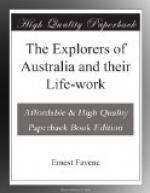Just here, let us compare this prophecy with a similar one made by Evans a few months afterwards, on the pasture lands of the upper Macquarie: “The increase of stock for some hundred years cannot overrun it.”
The provisions of the explorers were now nearly expended; their apparel, especially their footgear, was in rags and tatters; on the other hand, the work that they had set themselves to do was well done. They had vanquished the Blue Mountains. Their return was uneventful. After breakfast on the 6th of June, they crossed the Nepean, their provisions, with the exception of a little flour, being quite consumed. We thus see how in the end the impenetrable range, that had so long overawed the colonists with its frown, was overcome, with slight difficulty, when local experience combined with method, was arrayed against it. To liken the former expeditions to Blaxland’s is to compare a few headlong assaults with a well-conceived and skilfully worked-out attack. The men themselves write slightingly of the feat. Blaxland says: “the passage of the Blue Mountains might be easily effected.” Lawson’s opinion of the mountain is: “that there would be no difficulty in making a good road”; and Wentworth’s verdict is: “that the country they reached is easy of access.” Evans, who was hot upon their trail, gives as his opinion: “that there are no hills on the ridge that their ascent or descent is in any way difficult.”
The tidings brought back by the party of successful pioneers created the greatest excitement in the little colony. No longer would the mountainous barrier stand defiantly in their western path. For over thirty years it had laughed at their puny efforts to cross its rugged crest, but its time had come at last; the way to the unknown west was now open, and rejoicingly the settlers prepared to follow on the explorers’ trail. What the mysterious interior might hold, they could not imagine; but the gates thereto being thrown wide at last, its secrets would be soon known to them.
Blaxland died on the 3rd of January, 1853, having lived long enough to witness the wonderful advance in settlement due to his energies.
CHAPTER 2. GEORGE WILLIAM EVANS.
[Illustration. George W. Evans, Discoverer of the Macquarie and Lachlan Rivers.]
2.1. First inland exploration.
George William Evans, Deputy-Surveyor of Lands, came forward at this stage as the most prominent figure in Australian exploration. To him is due the honour, without dispute or cavil, of being the first discoverer of an Australian river flowing into the interior. For some reason he has never received adequate recognition of his important explorations, and he is well-nigh forgotten by the people of New South Wales, the state that has benefited most by his labours. After Oxley’s second expedition, his name appears to have been overshadowed by his official superior’s. Yet his work was invariably successful, and his labour in the field unremitting.




